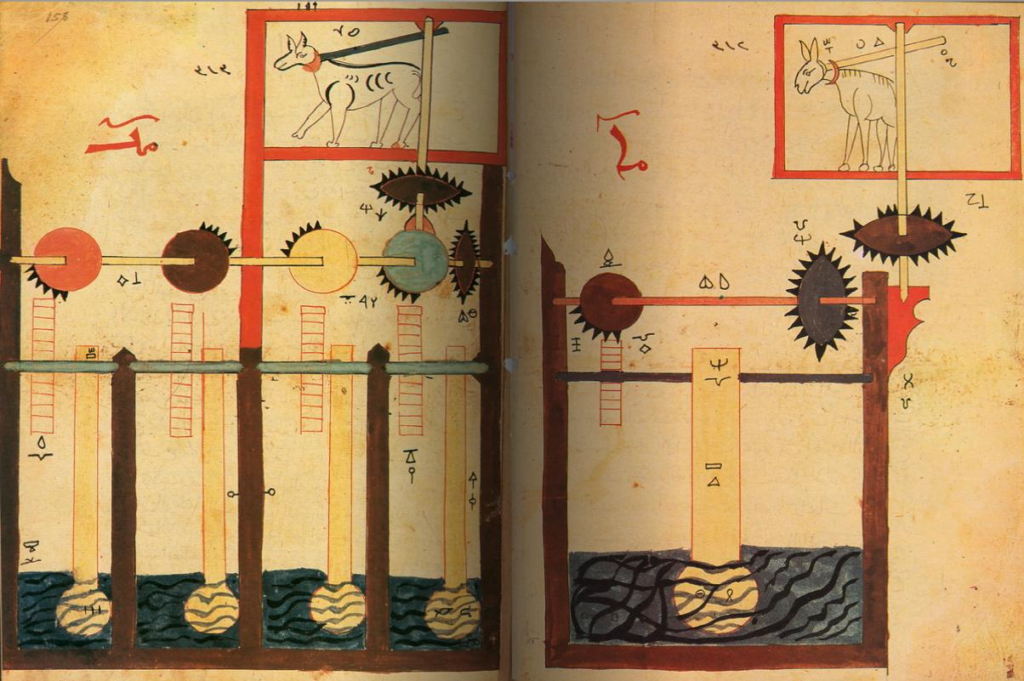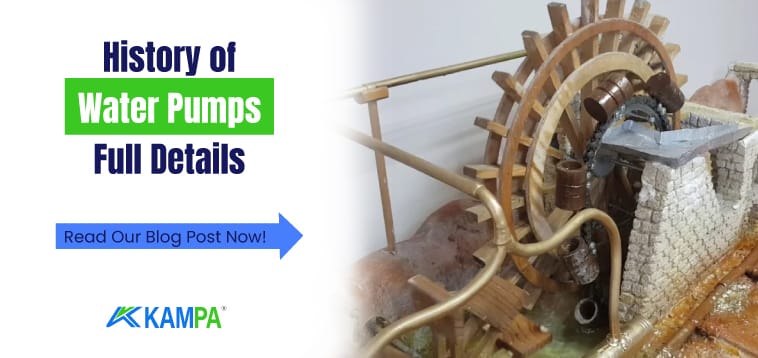History of Water Pumps Full Details
The history of water pumps has a long history. Humans have developed various pumping methods for storing, transporting and using water for thousands of years. Here is the basic history of water pumps:
Table of Contents
Who Invented the First Water Pump: It is difficult to know exactly who invented the water pump and when, as the history of water pumps goes back thousands of years and records may be limited or incomplete.
However, water pumps have been developed in different civilizations and cultures throughout history. The “Hero’s Pump” developed by the Greek mathematician and engineer Hero in the 3rd century BC was the first water pump.
In some sources; One of the first pumps was designed by Archimedes in the 3rd century BC. It works using the principle that mechanical forces push matter with physical lifting or compression force.
Al-Jazari (Al-Jazari) was a 12th century Islamic scholar and inventor, known for developing many mechanical inventions and devices, such as the water pump. Al-Jazari lived during the Islamic Golden Age and his works have had a major impact on the fields of mechanics, hydraulics and automation.
Al-Jazari described different types of water clocks and water pumps in his work “Al-Jāmi’ Beyn Al-Ilmi’l-Irādāt wa’l-āmal-i-Nāfiāt fī Sınā’ati’l-Hiyel”. In this work, he explained how mechanical devices could work by using the energy of falling water.
In addition, “Al-Jāmi’ Bayn Al-Ilmi’l-Irādāt wa’l-āmal-i-Nāfiāt fī Sınā’ati’l-Hiyel”, which includes various mechanisms, water clocks and automatic mechanisms, was an important contribution to the history of mechanical engineering.

Some of the mechanical devices developed by Al-Jazari in relation to water pumps are as follows:
- Water Pump: Al-Jazari developed the “sakia”, a mechanical water pump. In this pump, as water is taken from containers built on a wheel and carried upwards, the water in the containers is accumulated as it rises and transferred to a higher tank. In this way, water is moved from tank to tank, allowing water to be transported to high places.
- Water Clocks Al-Jazari developed water clocks that worked by using the fall of water. In these clocks, the fall of water in a container at a certain speed was used to measure time.
Al-Jazari’s work reached Europe and other regions in the Middle Ages and contributed to the development of mechanical science. His works played an important role in the spread of knowledge and technology and served as the basis for modern engineering fields. The legacy of al-Jazari’s inventions and works has been an important contribution to the history of science.
HISTORY OF WATER PUMPS AND THEIR EVOLUTION FROM PAST TO PRESENT
Antiquity: Humans developed a variety of simple water-lifting mechanisms to meet the need for agricultural irrigation and water transportation. History of water pumps Ancient civilizations such as Egypt and Mesopotamia used simple water-lifting wheels and impellers to irrigate irrigation canals and farmland. These mechanisms were usually powered by human or animal power.

Ancient Greeks: They used simple paddlewheel water lifting machines that pulled water up by rotational motion. During the Roman Empire, Roman waterways and water lifting systems were developed for the transportation and supply of water to cities.
In the history of water pumps, these systems were used to bring water from remote areas through pipes and distribute it to the cities by raising it over the aqueduct.

Middle Ages (500-1500 AD): In the Middle Ages, more advanced hydraulically powered water pumps were developed. One of the most famous pumps is “Hero’s Pump”, designed by the Greek mathematician and engineer Hero in the 3rd century AD. This is a device that moves water upwards using the principles of atmospheric pressure and vacuum.

Renaissance and After (15th and 16th century): During the Renaissance, the technology of water pumps developed significantly.
In the 16th century, the first known book on the design of water pumps was written by the German engineer Conrad Kyeser.
In addition, the mathematician and scientist Blaise Pascal made important contributions to the principles of hydraulics and the use of pressurized water in the 17th century.
Industrial Revolution The Industrial Revolution contributed to making water pumps and other hydraulic devices more powerful and efficient. The use of steam power enabled the large-scale use of water pumps and facilitated the transportation and use of water in industrial processes.
Modern Era: Electrically powered water pumps became widespread in the early 20th century. Electric power made water pumps more efficient and powerful and made the transportation and distribution of water easier.
Today, different types of water pumps are widely used in many areas such as agricultural irrigation, drinking water supply, industrial applications, waste water management and drainage.
Water pumps play an important role in enabling modern society to effectively manage water resources and ensure the efficient use of water. With advancing technology, water pumps continue to become more efficient and environmentally friendly.

History of Water Pumps What Would Have Happened If They Were Not Invented?
If water pumps had never been invented, there would have been many negative impacts and limitations:
- Water Supply Would Be Difficult: Without water pumps, it would be very difficult to transport water to high places. This would have restricted settlements and agricultural land to certain areas, making access to water difficult.
- Agricultural Production Would Decrease: Agriculture is a sector with a high demand for water. Without water pumps, irrigation would be more difficult and costly as it would be harder to transport water to agricultural lands. This would negatively affect agricultural production and reduce food production.
- Industrial production would be restricted: Industrial plants need water, and without water pumps, it would be difficult to transport and use water to businesses. This would restrict industrial production and have a negative impact on the economy.
- Drinking Water Supply Would Be Difficult: Drinking water supply in cities and residential areas would be very difficult without water pumps. There would be serious problems in accessing drinking water and the risk of spreading epidemics would increase.
- Sewage and wastewater management would be more difficult: Without water pumps, the collection and removal of wastewater would be more difficult. This would have led to increased pollution and the inability to prevent the spread of disease.
- Hydroelectric Power Generation Would Be Limited: Water pumps allow hydroelectric power plants to take water from high above and use it to generate energy through turbines. The absence of this technology would limit clean energy production and affect energy supply.
As a result, the failure to invent water pumps makes it difficult to use water resources efficiently and effectively, affects agricultural and industrial production, complicates drinking water and wastewater management, and restricts energy production.
The quality of life of modern society would be greatly affected and access to water resources would be a major problem. Fortunately, water pumps exist and are used as a vital tool for the effective management of water.
Click here for detailed information about water pumps. Click here for water pump prices.

